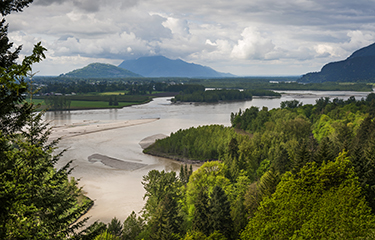US Supreme Court deals blow to EPA’s reach under Clean Water Act

The United States Supreme Court rolled back the U.S. Environmental Protection Agency’s ability to regulate wetlands under the Clean Water Act, ruling that the law only applies to wetlands that are indistinguishable from “waters of the United States.”
Environmental groups have condemned the court’s decision as a limitation on the ability of communities to protect waterways and the fish that live in them, but others argue that it’s a necessary curtailment of federal overreach and state bodies can better balance environmental protections and local needs.
Passed in 1972, the Clean Water Act prohibits the discharge of pollutants into the “waters of the United States.” Groups have argued over what areas fall under the legislations’ reach for decades, but the battle culminated in a lawsuit filed by a couple in the U.S. state of Idaho trying to build a home on their land. The EPA argued that their property contained wetlands, and therefore required a permit under the Clean Water Act.
On 25 May, the Supreme Court ruled 9-0 against the agency in Sackett v. EPA, with the majority opinion substantially limiting the amount of wetlands that fall under the Clean Water Act.
The Supreme Court’s ruling comes as a blow the administration of U.S. President Joe Biden, which has worked to expand the definition of “waters of the United States.” The EPA and U.S. Department of the Army issued a final definition in December 2022.
“The Supreme Court’s disappointing decision in Sackett v. EPA will take our country backwards,” Biden said in a statement. “It puts our nation’s wetlands – and the rivers, streams, lakes, and ponds connected to them – at risk of pollution and destruction, jeopardizing the sources of clean water that millions of American families, farmers, and businesses rely on.”
Many environmental groups also expressed disappointment with the court’s decision.
“The court’s ruling will be bad for the environment and for hunting and fishing,” the Theodore Roosevelt Conservation Partnership said in a statement. “It is past time for Congress to specifically address the issue by defining the scope of the Clean Water Act in a way that protects the environment, provides certainty for landowners and industry, and sustains our sports,”
Nonprofit Earthjustice also condemned the court’s ruling. The group filed an amicus brief in support of the EPA’s position on behalf of 18 Tribes, arguing among other things that rolling back the Clean Water Act would limit the Swinomish Indian Tribal Community’s ability to protect salmon habitat along the Skagit River in Washington state. The Tribe used the Clean Water Act to halt development of wetlands that it considers crucial for juvenile salmon.
“Through the permitting process and requirements, the Tribe has previously secured permit requirements that require restoration of wetlands necessary for juvenile salmon development,” the nonprofit wrote to the court. “Shrinking the scope of the act such that fewer wetland-damaging activities require Section 404 permits would leave more wetlands in the Skagit unprotected and would eliminate one of the few procedures by which Swinomish can engage with its trustees to protect and restore off reservation habitat that is critical to salmon.”
Alaska Environment described the court’s ruling as “devastating” and called on Congress to restore federal protections.
“[Wetlands] are the breeding ground for many of our fish,” Alaska Environment Research and Policy Center State Director Dyani Chapman said in a statement. “After this decision, the federal government – and citizens who rely on the Clean Water Act in court – will be powerless to stop developers, mining operators, and oil and gas companies from degrading or polluting these wetlands, putting our wildlife, drinking water, and communities at risk.”
More than 60 percent of U.S. wetlands are in Alaska.
In contrast, the Alaska Governor Mike Dunleavy praised the Supreme Court’s ruling.
“The court made the right call in limiting federal jurisdiction over wetlands and placing decision-making power back in the hands of states,” Dunleavy said.
Alaska was one of the states to file an amicus brief in support of the petitioners, arguing that the state’s regulatory infrastructure was better suited to protecting Alaska fish while meeting local needs.
“State-level efforts, like Alaska’s, are tailored to local conditions and leverage local insight. Burdensome federal encroachment on states’ powers over local lands and waters hinders states’ abilities to meet their unique needs and, ultimately, is unnecessary to maintain the chemical, physical, and biological integrity of local water," the Alaska state government said.
Photo courtesy of Edmund Lowe Photography/Shutterstock






Share